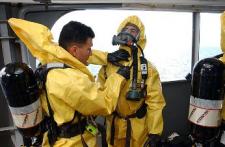Find the time to discuss new bioweapons
By Malcolm Dando,
Nature World View
| 07. 05. 2016
In Geneva next month, officials will discuss updates to the global treaty that outlaws the use of biological weapons. The 1972 Biological Weapons Convention (BWC) was the first agreement to ban an entire class of weapons, and it remains a crucial instrument to stop scientific research on viruses, bacteria and toxins from being diverted into military programmes.
The BWC is the best route to ensure that nations take the biological-weapons threat seriously. Most countries have struggled to develop and introduce strong and effective national programmes — witness the difficulty the United States had in agreeing what oversight system should be applied to gain-of-function experiments that created more- dangerous lab-grown versions of common pathogens.
As scientific work advances — the CRISPR gene-editing system has been flagged as the latest example of possible dual-use technology — this treaty needs to be regularly updated. This is especially important because it has no formal verification system. Proposals for declarations, monitoring visits and inspections were vetoed by the United States in 2001, on the grounds that such verification threatened national security and confidential business information...
Related Articles
By Ron Leuty, San Francisco Business Times | 06.16.2025
23andMe's two-step sale to a nonprofit led by former CEO Anne Wojcicki is nothing more than a dance around California's genetic privacy law, state Attorney General Rob Bonta said in a filing late Monday, one day before a judge will...
By Staff, The Associated Press | 06.10.2025
PORTLAND, Ore. — Twenty-seven states and the District of Columbia on Monday filed a lawsuit in bankruptcy court seeking to block the sale of personal genetic data by 23andMe without customer consent. The lawsuit comes as a biotechnology company seeks...
By Donald Earl Collins, Al Jazeera | 05.23.2025
“The picture of the world’s richest man killing the world’s poorest children is not a pretty one,” Microsoft founder and billionaire philanthropist Bill Gates said of Elon Musk during an interview with The Financial Times earlier this month. Gates indirectly...
By Katie Sagaser, The DNA Exchange | 05.27.2025
Disclaimer: The views and opinions expressed in this piece are solely my own and do not represent those of my employer, past or present, or any affiliated institutions. This content is provided for general informational purposes only and does not...




